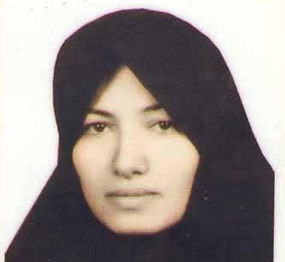Friday, December 17, 2010
|
Home
>
Radio Zamaneh in English
>
Latest News
>
Iran condemns international interference in its judcial affairs
|
Iran condemns international interference in its judcial affairs

Sakineh Mohammadi Ashtiani
Iranian judiciary’s human rights headquarters condemned the international community for taking a stance against the case of Sakineh Mohammadi Ashtiani “without access to reliable sources.”
Iranian judiciary sentenced Sakineh Mohammdi Ashtiani to death by stoning for committing adultery.
International outrage against this case led to a campaign to stop her sentence. Consequently, Iran announced that the stoning sentence was withdrawn; however, Mohamamdi Ashtiani would still have to be executed.
The US, the EU, Britain and international human rights groups have tried to stop the execution.
ILNA reports that the human rights headquarters of the Iranian judiciary describes the reactions to the case of Sakineh Mohammadi Ashtiani as “a kind of wrongful, unfair and biased prejudice.”
Iran’s human rights headquarters stresses that it is not “incumbent” on them to justify the contents of a judicial case, and this announcement has been prepared in order to “illuminate public minds.”
The human rights headquarters also contends that their efforts are responsible for the withdrawal of the stoning sentence despite the “definitiveness” of the sentencing.
The announcement also indicates that according to the evidence at hand, “Mrs. Sakineh Mohammadi Ashtiani’s charges have been proven” and it has revealed evidence of her complicity in the murder of her husband.
Sakineh Mohammadi Ashtiani was charged with the murder of her husband in 2009, but the case was dropped with the consent of the victim’s family. The stoning sentence was issued later for the charge of “adultery” while she had already been flogged for having sexual relations with two men after the death of her husband.
Two weeks ago, Mohammadi Ashtiani appeared in front of the camera in an Iranian state television program confessing to the murder of her husband.
One of her lawyers, Javeed Kian told the media: “Mrs. Mohammadi was taken to room 37 of Tabriz Prison where she was coerced to make self-incriminating statements, but these confessions were not made under normal conditions and according to information that has reached me, Mrs. Mohammadi was severely beaten and forced to do the interview.”
|
|

